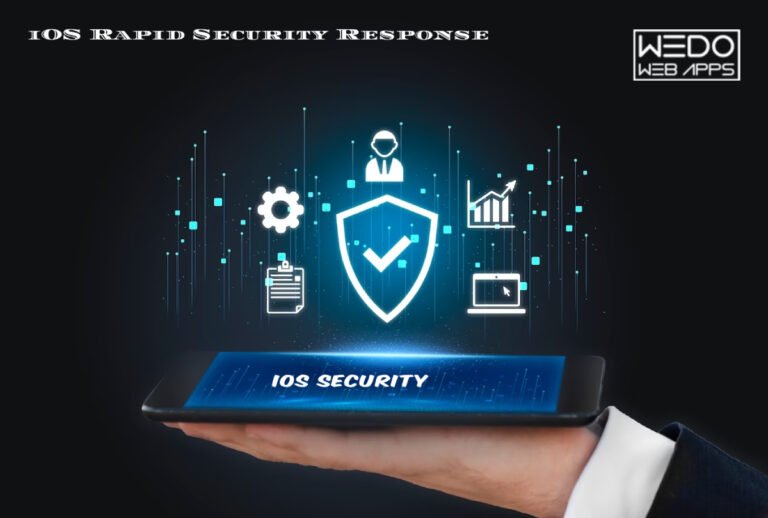30 Jun, 2023 | mobile development company
iOS Rapid Security Response: Enhancing Apple's Commitment to User Protection

Introduction
In today's interconnected world, the security of mobile devices and operating systems is of paramount importance. iOS, the operating system developed by Apple Inc., has gained a reputation for its robust security features and proactive approach to addressing vulnerabilities. One crucial aspect of iOS security is its rapid security response, which enables Apple to swiftly identify, analyze, and mitigate potential security threats. This article explores the concept of iOS security response, its significance, and how Apple continuously improves it to safeguard user data and privacy.1. Understanding iOS Security Response
iOS security response refers to Apple's systematic approach to addressing and mitigating security vulnerabilities in the iOS operating system and associated devices, such as iPhones and iPads. It involves a coordinated effort between Apple's security team, developers, and researchers to identify potential threats, assess their severity, and promptly implement necessary patches or updates to protect users from potential exploits.2. The Importance of iOS Security Response
The rapid response to security vulnerabilities in iOS is vital for several reasons:a. User Protection:
The primary objective of iOS security response is to protect users from potential threats that may compromise their data, privacy, or device functionality. Swift identification and mitigation of security vulnerabilities help prevent unauthorized access, data breaches, or malware attacks.b. Maintaining Trust:
By prioritizing user safety and promptly addressing security concerns, Apple maintains the trust and confidence of its customer base. This commitment to security is a key differentiating factor for iOS devices, reinforcing their reputation as secure platforms.c. Staying Ahead of Threats:
In the ever-evolving landscape of cybersecurity, staying ahead of potential threats is crucial. Apple's rapid security response allows the company to proactively address vulnerabilities, reducing the window of opportunity for attackers and minimizing the potential impact on users.3. Evolution of iOS Security Response
Over the years, Apple has continuously refined and enhanced its iOS security response. This evolution can be observed in the introduction of new security features, improved collaboration with security researchers, and the adoption of responsible vulnerability disclosure practices.a. Security Features:
With each iOS update, Apple introduces new security features aimed at strengthening the overall security posture of its devices. These features include enhanced encryption, biometric authentication, secure boot chain, sandboxing, and app isolation, among others. By integrating these features, Apple ensures that its devices are equipped to handle emerging security threats effectively.b. Collaboration with Researchers:
Apple actively collaborates with independent security researchers through programs such as the Apple Security Bounty program. This initiative encourages researchers to responsibly disclose vulnerabilities they discover, allowing Apple to address them swiftly and reward researchers for their contributions.c. Responsible Vulnerability Disclosure:
Apple follows a responsible vulnerability disclosure process, working closely with researchers to understand and address identified vulnerabilities before disclosing them publicly. This approach minimizes the risk of exploits being weaponized by malicious actors while ensuring that Apple can provide effective patches or updates.4. Apple iOS Rapid Security Response: Version 16.4.1.a
Apple's commitment to iOS security response is evident in the release of version 16.4.1.a, which showcases the company's continuous efforts to enhance security measures.a. Enhanced Threat Detection:
The latest iOS version includes advanced threat detection mechanisms that leverage machine learning and AI algorithms. These algorithms analyze system behavior, network activity, and app interactions to detect and mitigate potential security threats in real-time.b. Exploit Mitigation:
Version 16.4.1.a incorporates specific exploit mitigation techniques, such as stack overflow protection and control-flow integrity enforcement. These measures safeguard against common attack vectors, making it significantly more challenging for attackers to exploit vulnerabilities in the operating system.c. Secure Communications:
Apple has prioritized secure communication protocols, ensuring that user data remains protected during data transfers and internet connectivity. Version 16.4.1.a incorporates robust encryption algorithms and strengthens secure communication channels, reducing the risk of data interception or unauthorized access.d. Swift Patching:
Apple's rapid security response is exemplified by its commitment to timely patching. Version 16.4.1.a introduces a streamlined patching process that enables faster deployment of security updates. This ensures that users receive critical security fixes promptly, minimizing the vulnerability window and reducing the risk of exploitation.e. Bug Fixes:
In addition to security enhancements, version 16.4.1.a addresses various bug fixes and performance improvements. By resolving known issues, Apple not only enhances the user experience but also eliminates potential security vulnerabilities that may arise from software glitches or system instability. Wants to know more regarding ios security visit iOS App Development Agency.5. iPad iOS Rapid Security Response
Apple's dedication to iOS security response extends to its iPad devices as well. iPad users benefit from the same robust security features, timely security updates, and rapid response to vulnerabilities. The iPad's seamless integration with the iOS ecosystem ensures that security measures implemented on iPhones are also extended to iPads. This uniform approach to security enhances the protection of user data, regardless of the Apple device being used. Furthermore, Apple's iPadOS updates align with iOS updates, ensuring that iPad users receive the latest security patches and features simultaneously. This synchronized approach underscores Apple's commitment to providing a consistent and secure experience across its entire product lineup.6. How does iOS Rapid Security Response work?
RSR updates are delivered through the same software update mechanism as regular iOS updates. However, instead of being installed as a full software update, RSR updates are installed as a separate component. This allows Apple to deliver the updates more quickly and easily, without disrupting the user experience. When an RSR update is available, it will be displayed in the Software Update section of the Settings app. If you have the "Automatic Updates" setting turned on, your device will automatically download and install the update in the background. If you have the "Automatic Updates" setting turned off, you can manually install the update by tapping on "Download and Install."7. What are the benefits of iOS Rapid Security Response?
There are several benefits to using iOS Rapid Security Response:- Faster security updates: RSR updates can be delivered more quickly than traditional software updates. This means that Apple can protect users from new security vulnerabilities more quickly.
- Less disruption: RSR updates are installed as a separate component, so they do not require you to restart your device. This means that you can continue using your device as normal while the update is being installed.
- Improved security: RSR updates are designed to address critical security vulnerabilities. This helps to keep your device safe from malicious software.
Conclusion
iOS rapid security response is a cornerstone of Apple's commitment to user protection, privacy, and maintaining trust in its products. Through continuous refinement, collaboration with researchers, and the introduction of new security features, Apple ensures that iOS remains a secure operating system. The release of version 16.4.1.a exemplifies Apple's dedication to swift identification, analysis, and mitigation of security vulnerabilities, reinforcing its position as a leader in mobile security. As technology advances and new threats emerge, Apple's ongoing efforts to enhance iOS security response will play a crucial role in safeguarding user data and privacy. Users can trust that Apple remains proactive in addressing security concerns and providing timely updates to ensure their devices and personal information are protected. By prioritizing rapid security response, Apple sets a high standard for the industry and underscores the importance of a comprehensive and proactive approach to mobile device security. As users, it is essential to stay vigilant, keep devices up to date with the latest software releases, and leverage the robust security features provided by iOS to enhance personal security in an increasingly connected world. Keeping up with iOS rapid security response updates is vital for app security. Additionally, mastering the software development life cycle can streamline your development process.Frequently Asked Questions
To check if your device has iOS Rapid Security Response, open the Settings app and go to General > Software Update. If you see the "Security Responses & System Files" option, then your device has RSR enabled.
If you have not already enabled iOS Rapid Security Response, you can do so by following these steps:
- Open the Settings app.
- Go to General > Software Update.
- Tap on "Automatic Updates."
- Make sure "Security Responses & System Files" option is turned on.
If you no longer want to receive iOS Rapid Security Response updates, you can remove them by following these steps:
- Open the Settings app.
- Go to General > About.
- Tap on the iOS or iPadOS version number.
- Tap on "Remove Security Response."
- Tap on "Remove" to confirm.
Yes, iOS Rapid Security Response is safe. It is a legitimate security feature that is designed to protect your device from malicious software.

